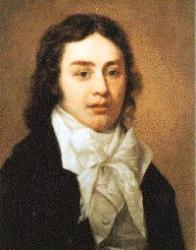
1772 - 1834 Author of "The Shepherds went their hasty way" Coleridge, Samuel Taylor, was born at St. Mary Ottery, Devonshire, 1772, educated at Christ's Hospital, London, and Jesus College, Cambridge, and died in 1834. His Child's Prayer at Evening, "Ere on my bed my limbs I lay," in Martineau's Hymns, 1840 and 1873, is dated 1808.
--John Julian, Dictionary of Hymnology (1907)
=================
Samuel Taylor Coleridge; 21 October 1772 – 25 July 1834) was an English poet, Romantic, literary critic and philosopher who, with his friend William Wordsworth, was a founder of the Romantic Movement in England and a member of the Lake Poets. He is probably best known for his poems The Rime of the Ancient Mariner and Kubla Khan, as well as for his major prose work Biographia Literaria. His critical work, especially on Shakespeare, was highly influential, and he helped introduce German idealist philosophy to English-speaking culture. He coined many familiar words and phrases, including the celebrated suspension of disbelief. He was a major influence, via Emerson, on American transcendentalism.
Throughout his adult life, Coleridge suffered from crippling bouts of anxiety and depression; it has been speculated by some that he suffered from bipolar disorder, a condition as yet unidentified during his lifetime. Coleridge suffered from poor health that may have stemmed from a bout of rheumatic fever and other childhood illnesses. He was treated for these concerns with laudanum, which fostered a lifelong opium addiction.
--excerpt from en.wikipedia.org
Samuel Taylor Coleridge


 My Starred Hymns
My Starred Hymns



